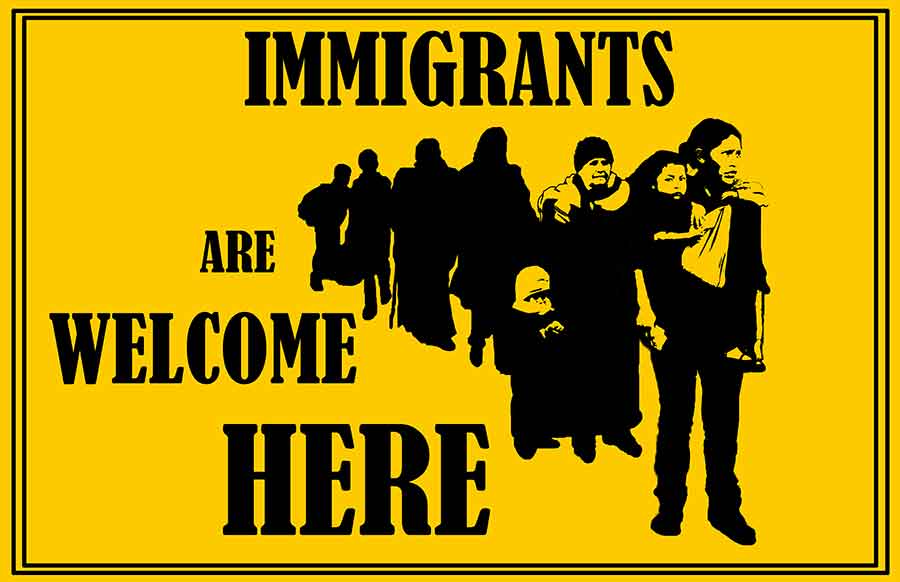The Bahá’í Faith, with its profound emphasis on unity and compassion, presents a distinctive approach to the welcoming of immigrants and strangers. This ethos is deeply embedded in its foundational teachings, akin to the nurturing warmth of a great tree providing shelter for those who seek refuge beneath its expansive branches. The Bahá’í view reframes the immigrant experience into a transformative journey, one that enriches the social fabric of communities following the divine precepts of love and acceptance. In this discussion, we will explore how Bahá’í teachings illuminate the path towards inclusivity, orchestrate harmonious relationships across diverse cultures, and promote the essential dignity of every individual.
At the heart of Bahá’í doctrine lies the concept of the oneness of humanity. This principle asserts that all people are interconnected, transcending geographical, racial, and cultural boundaries. To Bahá’ís, every immigrant is not merely a statistic or a source of economic labor; they are valuable souls imbued with unique contributions and diverse narratives. Encouraging this perspective begins with recognizing that every individual is a reflection of the divine, deserving of dignity and respect. The teachings of Bahá’u’lláh advocate for viewing immigrants through a lens of compassion rather than suspicion, thereby creating a fertile ground for genuine connections.
Being receptive to the needs of newcomers can be likened to tending to a garden. Just as a gardener must prepare the soil, carefully planting seeds in an environment conducive to growth, society must cultivate a spirit of acceptance. This involves providing resources, support systems, and a welcoming attitude to help immigrants flourish. The Bahá’í community often engages in initiatives aimed at easing the transition for newcomers, such as hosting cultural exchange programs, language classes, and community outreach events. Through these efforts, the seeds of understanding are sown, enabling the flourishing of multicultural relationships.
In addition, the Bahá’í teachings articulate a profound commitment to justice and equity. The laws of society should reflect these values, promoting a framework in which all individuals, regardless of their immigration status or origin, are granted fair treatment. Advocacy for immigrants’ rights is thus an extension of the Bahá’í duty to uphold justice. Practitioners are encouraged to engage in dialogues around immigration policy, driving initiatives that protect the rights and dignities of all individuals. This engagement echoes the call of Bahá’u’lláh to work towards the elimination of prejudice and inequality in every form, thereby paralleling the struggle of the oppressed across the globe.
Moreover, the interconnectedness of global communities provides vast opportunities for collaboration. In a world where displacement is a growing reality, Bahá’í teaching implores individuals to rise above fear and isolationism. Rather than erecting barriers, the call to action is clear: build bridges. One of the metaphors that emerges is that of a shoreline where different tides meet. Immigrants, like the relentless waves of the ocean, bring with them stories, traditions, and experiences that can transform coastal landscapes—communities—into vibrant hubs of innovation and creativity. Establishing a society that celebrates this confluence of cultures not only enriches local environments but creates a more harmonious global community.
Furthermore, the concept of hospitality holds tremendous significance in Bahá’í practice. To welcome strangers into one’s home or community is to engage in an act of profound love. Bahá’ís are encouraged to embody this spirit in both personal and collective spheres. Organizing community events focused on cuisine, art, and music from various cultures can serve to break down barriers. By fostering an inclusive environment that cherishes diversity, communities become more resilient, open to dialogues that bridge cultural divides and dispel misunderstandings.
The teachings of Bahá’u’lláh serve as a beacon, guiding individuals towards an engaged and compassionate approach to immigration. Central to this message is the idea of service. Bahá’ís are reminded that serving others is, in essence, serving God. This can manifest through volunteering at local shelters, participating in advocacy groups, or simply offering a listening ear to those navigating the challenges of displacement. Each act of kindness propagates a profound ripple effect, fostering a culture entrenched in benevolence and mutual respect.
As part of this welcoming approach, a significant emphasis is placed on education. A well-informed community is better poised to approach immigration with empathy rather than hostility. Educational initiatives that explore the histories, traditions, and contributions of immigrant populations can dispel myths and break down stereotypes. Such enlightened understanding becomes a tool for nurturing relationships, fostering an environment where dialogue flourishes and mistrust diminishes.
In essence, the Bahá’í teachings present a harmonized model of welcoming immigrants and strangers, one saturated with compassion, justice, and unity. It underpins the importance of reimagining the narrative surrounding immigrants—shifting from one of burden to one of shared enrichment. By treating newcomers as integral threads in the greater tapestry of society, Bahá’ís foster a radical transformation in perception that serves both the individual and the community. Thus, the Bahá’í ethos inspires a sustainable, interconnected world where the immigrant experience is celebrated as a collective journey towards a transcendent future—a future that embraces all members of the human family.
